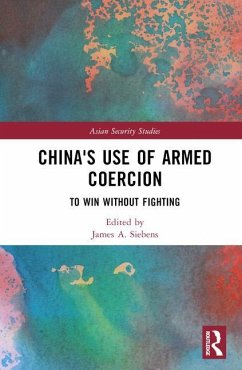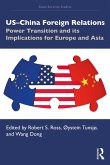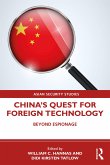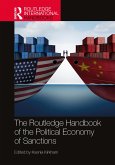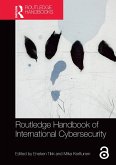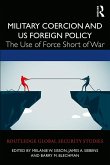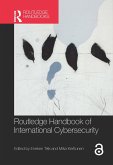This book analyzes when, how, why, and to what effect China has used its armed forces in recent decades to coerce other actors in the international system.
Over the past 20 years, China's international status as a "great power" has become undeniable. China's "peaceful rise" has included substantial investments in military modernization and an increasingly assertive regional posture. While China has not waged war since 1979, it has frequently resorted to what the U.S. State Department has referred to as "gangster tactics" - threats, intimidation, and armed confrontation - to advance its strategic aims. This volume illuminates the ways in which China has employed its military and paramilitary tools to coerce other states, and examines the motivations and specific foreign policy objectives that China has pursued using force short of war. The study presents new analysis of an original dataset on coercive actions undertaken by China's armed forces, taking into account the political objectives pursued and the environmental contexts in which these operations occurred. It also presents a series of expert case studies addressing the most consequential examples of China using force to coerce in recent decades. The volume contributes to a more historically informed, empirically based understanding of great power competition.
This book will be of much interest to students of Chinese security and foreign policy, strategic studies, Asian politics and International Relations.
Over the past 20 years, China's international status as a "great power" has become undeniable. China's "peaceful rise" has included substantial investments in military modernization and an increasingly assertive regional posture. While China has not waged war since 1979, it has frequently resorted to what the U.S. State Department has referred to as "gangster tactics" - threats, intimidation, and armed confrontation - to advance its strategic aims. This volume illuminates the ways in which China has employed its military and paramilitary tools to coerce other states, and examines the motivations and specific foreign policy objectives that China has pursued using force short of war. The study presents new analysis of an original dataset on coercive actions undertaken by China's armed forces, taking into account the political objectives pursued and the environmental contexts in which these operations occurred. It also presents a series of expert case studies addressing the most consequential examples of China using force to coerce in recent decades. The volume contributes to a more historically informed, empirically based understanding of great power competition.
This book will be of much interest to students of Chinese security and foreign policy, strategic studies, Asian politics and International Relations.
'As the United States shifts its focus to China, most studies examine a potential conventional war. In contrast, this impressive volume examines China's actual successes and failures with using military and paramilitary forces to achieve peacetime objectives. Every serious student of China will benefit from the insights it provides.'
T. X. Hammes, Distinguished Research Fellow, US National Defense University, Washington DC
'In this excellent volume, Siebens and colleagues underscore how China uses its armed forces-historically and today-to coerce, intimidate, influence, and mess with other countries' collective minds as much as to fight and win full-fledged wars. This insight is crucial for today's US strategy debate.'
Michael O'Hanlon, Senior Fellow and Director of Research in Foreign Policy, Brookings Institution, Washington DC
'[This book] effectively weaves together historical, political, and military analysis to provide a robust picture of the dynamic threat environment in East Asia. It thoughtfully traces the evolution of China's approach to coercion in the 21st century, including modern "salami-slicing" through paramilitary, military, and gray-zone warfare. Siebens provides a detailed guide for U.S. and allied policymakers and military leadership considering what Chinese strategy, operations, and tactics in the South China Sea and greater Indo-Pacific region might look like in the coming years.'
Admiral James G. 'Jamie' Foggo, USN (Ret.), Dean of the Center for Maritime Strategy, Navy League of the United States
'Siebens and his colleagues provide a detailed study of China's past use of coercion and outright force to attain its national goals and protect its interests. The successes and failures of these efforts, and their close association with the defense of specific, long-standing sovereignty claims, call into question the simplistic notion, touted by many in Washington, that Beijing is simply an aggressive power bent on military domination across the board. Siebens argues, correctly, that the proper response to China's gray-zone, coercive tactics, is to help increase the capacity of more vulnerable states to detect and resist Chinese coercion. A valuable study that should be read by every policy practitioner.'
Dr. Michael Swaine, Senior Research Fellow, East Asia Program, Quincy Institute for Responsible Statecraft
'[This book] is one of the most important analyses to emerge in recent years on China's coercive behavior both below the threshold of conflict and on the verge of major war. It offers detailed background information on the nature and history of coercion in modern Chinese foreign policy, as well as its use in specific bilateral relationships and a new database and statistical analysis of the outcomes of recent Chinese coercion efforts. No one should evaluate Chinese coercive tactics from this point without reference to this rich and deeply researched book.'
Michael Mazarr, Senior Political Scientist, The RAND Corporation
T. X. Hammes, Distinguished Research Fellow, US National Defense University, Washington DC
'In this excellent volume, Siebens and colleagues underscore how China uses its armed forces-historically and today-to coerce, intimidate, influence, and mess with other countries' collective minds as much as to fight and win full-fledged wars. This insight is crucial for today's US strategy debate.'
Michael O'Hanlon, Senior Fellow and Director of Research in Foreign Policy, Brookings Institution, Washington DC
'[This book] effectively weaves together historical, political, and military analysis to provide a robust picture of the dynamic threat environment in East Asia. It thoughtfully traces the evolution of China's approach to coercion in the 21st century, including modern "salami-slicing" through paramilitary, military, and gray-zone warfare. Siebens provides a detailed guide for U.S. and allied policymakers and military leadership considering what Chinese strategy, operations, and tactics in the South China Sea and greater Indo-Pacific region might look like in the coming years.'
Admiral James G. 'Jamie' Foggo, USN (Ret.), Dean of the Center for Maritime Strategy, Navy League of the United States
'Siebens and his colleagues provide a detailed study of China's past use of coercion and outright force to attain its national goals and protect its interests. The successes and failures of these efforts, and their close association with the defense of specific, long-standing sovereignty claims, call into question the simplistic notion, touted by many in Washington, that Beijing is simply an aggressive power bent on military domination across the board. Siebens argues, correctly, that the proper response to China's gray-zone, coercive tactics, is to help increase the capacity of more vulnerable states to detect and resist Chinese coercion. A valuable study that should be read by every policy practitioner.'
Dr. Michael Swaine, Senior Research Fellow, East Asia Program, Quincy Institute for Responsible Statecraft
'[This book] is one of the most important analyses to emerge in recent years on China's coercive behavior both below the threshold of conflict and on the verge of major war. It offers detailed background information on the nature and history of coercion in modern Chinese foreign policy, as well as its use in specific bilateral relationships and a new database and statistical analysis of the outcomes of recent Chinese coercion efforts. No one should evaluate Chinese coercive tactics from this point without reference to this rich and deeply researched book.'
Michael Mazarr, Senior Political Scientist, The RAND Corporation

